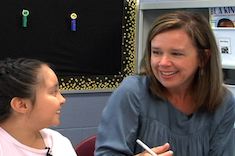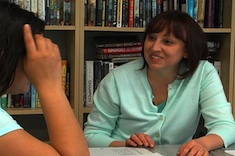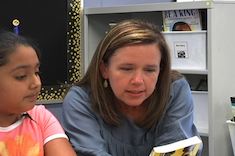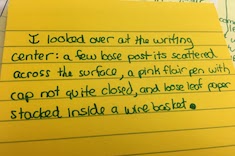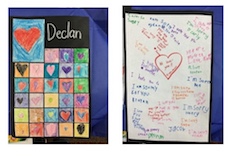Library
Choice Literacy Articles & Videos
The Choice Literacy library contains over 3,000 articles and 900 videos from 150+ contributors. Classic Classroom and Literacy Leadership subscribers have access to the entire library. Content is updated continuously, with five to six new features published each week.
Latest Content
Historical Fiction Background Folders
Tara Smith finds that students in book clubs reading historical fiction are often confused because they lack background knowledge. Her solution is to create background folders that include key documents to support the history in the texts.
July 10, 2020 When Your Glasses Fall Into the Lake
We look at ways to reinforce learning after minilessons in this week’s newsletter.
First-Grade Conference: Repeated Phrases in Writing
Bitsy Parks confers with Michael about his gingerbread man writing. She encourages him to use a repeated phrase in the writing, echoing a whole-class lesson on repeated phrases.
Out of Sight, Out of Mind: Accountability for Young Writers
Stella Villalba teaches young writers about writer’s craft. So how come evidence of learning from the minilessons isn’t showing up when she confers with her students? She decides to develop a plan to help students link craft lessons with their writing.
Balancing Conferences and Small Groups
Balancing small groups and conferences is essential for transferring learning from lessons and units, and it’s one of the trickiest tasks for teachers. Dana Murphy explains how she works toward balance in her classroom, weighing everything from the timeline of the unit to the intensity of the minilesson.
June 5, 2020 My Son
We help teachers move from teaching retelling to theme in this week’s newsletter.
Literary Analysis in Eighth Grade: Conferring
Christy Rush-Levine helps Alyssa draft her literary analysis essay.
Navigating the Interpretation Process
Tammy Mulligan shares how she introduces students to the process of interpreting literature at different grade and developmental levels.
Student Ownership of Literary Analysis
Christy Rush-Levine shares the strategies she uses to help her middle school students take ownership of their literary analysis essays.
May 29, 2020 Missing Hallways
We consider ways to boost summer learning in this week’s newsletter.
Fifth-Grade Reading Conference: Previewing
Dana Murphy confers with Krisha over her reading, talking about the value of using a book’s back cover for previewing.
Getting Students in the Learning Zone
The zone of proximal development (or ZPD) is the sweet spot for learning—just enough challenge with just enough support to take on the challenge. Melanie Meehan shares how teachers can create scaffolds in their classrooms that help students find their own ZPDs.
Pausing for Renewal Throughout the Day
Stella Villalba shares three strategies teachers and literacy coaches can use to pause, re-center, and renew themselves throughout busy, stressful days in schools.
May 22, 2020 Write Now
We look at writer’s craft in this week’s newsletter.
First-Grade Writing Share: Highlighting Craft
Bitsy Parks leads a writing share early in the year, presenting three student examples of writing and highlighting different aspects of writer’s craft linked to minilessons.
Dealing with Lists in Style
Polysyndeton, asyndeton—if you are a writer and a word nerd, you will love Gretchen Schroeder’s suggestions for helping your students create lists with style in their writing.
Studying Craft and Punctuation in Sentences from Read Alouds
Tara Barnett and Kate Mills share the power of teaching writer’s craft in bite-sized chunks, through careful study of mentor sentences in read alouds.
May 15, 2020 Seeking Community
We celebrate families in this week’s newsletter.
Reading Conference: Connections to Home
In this conference in Christy Rush-Levine’s eighth-grade classroom, Jaden is reading a book that mixes math with basketball, an activity he enjoys at home.
Keeping Parent Communication Open in Middle School
Tara Barnett and Kate Mills find that they have to change the way they think about connecting with families once students reach middle school.
Everyday Celebrations and Traditions
Bitsy Parks shares how she builds a learning community with displays and traditions that celebrate families.
May 8, 2020 Eagle’s Nest
We reflect on how to close out the year with read alouds and interviews in this week’s newsletter.
May 1, 2020 Virtual Third Things
Creative response from teachers and students is the focus of this week’s newsletter.
I’m Done! What’s Next?
Tammy Mulligan contemplates the unique pleasure of finishing a piece of writing, as well as the challenges of helping students figure out what’s next.
April 24, 2020 Truth and Judgment
Getting better feedback from teachers and students is the focus of this week’s newsletter.
Second-Grade Conference: Illustrations and Frames
Ruth Ayres confers with second grader Reagan about writing she is revising for publication about a class trip to the zoo that included her grandmother. Ruth introduces her to the concept of frames in illustrations, using an example from a picture book.
Making Our Writing Public
Jennifer Allen shares a project student writers complete with support from a local college to make writing public and widen the net for feedback.
Observing Skilled Readers
Mark Levine wonders why his most some of his most skilled readers take the most time to get through texts. So he asks them, and gets some fascinating answers he uses to assist struggling students.
April 17, 2020 An Amazing Time
This week we look at the gamut of emotions remote learning brings to teachers and students.
Reassuring Worried Children with Picture Books
Mandy Robek learns a lot about worry from her daughter, and at the same time discovers a treasure trove of children’s books to help students overcome worries.
Browse Content By
Type
Category
- Assessment Tools
- Big Fresh Archives
- Booklists
- Choice Numeracy
- Classroom Design
- Common Core
- Community Building
- Conferring
- Content Literacy
- Digital Literacy
- English Language Learners
- Equity
- Family Relations
- Free Samples
- Guiding Groups
- Leadership
- Literacy Coaches
- Mentor Texts
- Minilessons
- New Teacher Mentors
- Podcasts
- Poetry
- Quote Collections
- Reading Strategies
- Self Care
- Struggling and Striving Learners
- Talking and Listening
- Teacher Study Groups
- Teaching Reading
- Teaching Writing
- Word Study and Vocabulary
Author
- Melissa Quimby
- Nawal Qarooni
- Gwen Blumberg
- Julie Cox
- The Lead Learners
- Hannah Tills
- Josie Stewart
- Ruth Metcalfe
- Mallory Messenger
- Becca Burk
- Jodie Bailey
- Vivian Chen
- Mary Brower
- Tiffany Abbott Fuller
- Stephanie Affinito
- Ruth Ayres
- Leigh Anne Eck
- Heather Fisher
- Shari Frost
- Julie Johnson
- Suzy Kaback
- Gigi McAllister
- Shirl McPhillips
- Melanie Meehan
- Cathy Mere
- Debbie Miller
- Tara Barnett and Kate Mills
- Tammy Mulligan
- Dana Murphy
- Bitsy Parks
- David Pittman
- Brenda Power
- Heather Rader
- Matt Renwick
- Mandy Robek
- Christy Rush-Levine
- Gretchen Schroeder
- Jen Schwanke
- Brian Sepe
- Katherine Sokolowski
- Stella Villalba
- Jennifer Vincent
Grade Level
Choice Literacy Membership
Articles
Get full access to all Choice Literacy article content
Videos
Get full access to all Choice Literacy video content
Courses
Access Choice Literacy course curriculum and training





